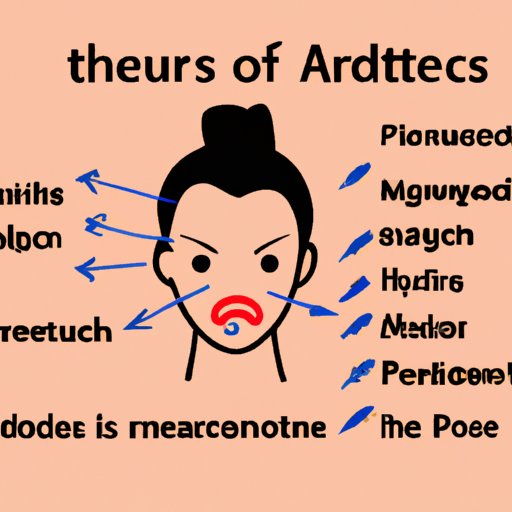Introduction
Acne is a common skin condition that affects many people. It can range from mild breakouts to more severe, cystic forms of acne. One area of the body that is commonly affected by this skin condition is the forehead. In this article, we will explore the various causes, types, triggers, and treatments for forehead acne.
Analyzing the Causes Behind Forehead Acne
Forehead acne can be caused by a variety of factors, including hormonal imbalances, genetics, and bacterial infections. Hormonal imbalances can cause an increase in oil production, which can lead to clogged pores and the development of acne. Genetics also play a role in the development of acne, as some individuals are more prone to its development than others. Finally, bacterial infections such as Staphylococcus aureus can contribute to the development of forehead acne.

Understanding the Different Types of Forehead Acne
There are several different types of acne that can occur on the forehead. Whiteheads are small bumps that appear under the surface of the skin and contain white or yellowish pus. Blackheads are dark spots that form when oil and dirt become trapped in the pores. Papules are small, red bumps that are tender to the touch. Pustules are similar to papules, but they contain pus. Cysts are large, painful bumps that can become infected if not treated properly.
Exploring Treatments for Forehead Acne
There are a variety of treatments available for forehead acne. Over-the-counter medications such as benzoyl peroxide and salicylic acid can help to reduce inflammation and clear away bacteria. Prescription medications such as antibiotics and retinoids can also be effective in treating more severe cases of acne. Home remedies such as tea tree oil, aloe vera, and honey can also be used to reduce inflammation and clear away bacteria. Professional treatments such as chemical peels, laser therapy, and dermabrasion can also be used to treat more severe cases of acne.
Investigating Possible Triggers for Forehead Acne
Certain environmental factors, stress, and diet can all trigger forehead acne. Environmental factors such as air pollution, heat, and humidity can cause skin irritation and increase oil production, leading to the development of acne. Stress can also trigger acne as it can cause an increase in hormones, which can lead to an increase in oil production. Diet can also play a role in the development of acne, as certain foods such as dairy, sugar, and processed foods can all trigger breakouts.

Examining How Diet and Lifestyle Choices May Affect Forehead Acne
Making certain dietary and lifestyle changes can help to reduce the severity of forehead acne. Foods to avoid include dairy, sugar, processed foods, and fried foods. Foods to include in the diet are fruits and vegetables, nuts and seeds, whole grains, and healthy fats. Exercise can also help to reduce stress levels, which can help to reduce acne flare-ups. Additionally, practicing good skin care habits such as using non-comedogenic products and protecting the skin from the sun can help to keep the skin healthy and reduce the risk of developing acne.

Assessing How Stress Can Impact Forehead Acne
Stress can have a major impact on forehead acne. Physical symptoms of stress such as headaches, fatigue, and muscle tension can all lead to an increase in hormones, which can trigger acne flare-ups. Ways to manage stress include getting enough sleep, exercising regularly, and practicing relaxation techniques such as meditation and yoga. Additionally, talking to a therapist or counselor can help to identify the underlying causes of stress and develop coping strategies.
Conclusion
In conclusion, understanding the causes, types, triggers, and treatments of forehead acne is essential for managing this skin condition. Hormonal imbalances, genetics, and bacterial infections can all contribute to the development of forehead acne. There are several different types of acne that can occur on the forehead, including whiteheads, blackheads, papules, pustules, and cysts. Treatments for forehead acne include over-the-counter medications, prescription medications, home remedies, and professional treatments. Environmental factors, stress, and diet can all trigger forehead acne. Making certain dietary and lifestyle changes can help to reduce the severity of forehead acne, and managing stress levels can help to reduce flare-ups. By understanding the causes, types, triggers, and treatments of forehead acne, individuals can take steps to better manage this skin condition.


